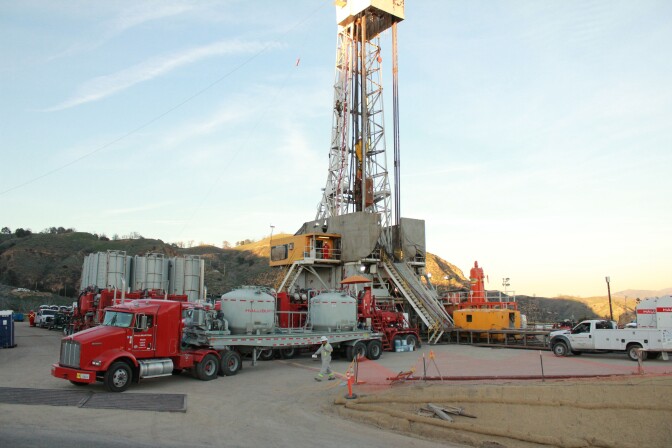This story is free to read because readers choose to support LAist. If you find value in independent local reporting, make a donation to power our newsroom today.
This archival content was originally written for and published on KPCC.org. Keep in mind that links and images may no longer work — and references may be outdated.
SoCal Gas hopes to reopen gas field that leaked by September

Southern California Gas Company is making progress toward its goal of reopening the underground storage field at Aliso Canyon, the company's chief executive said Thursday.
The field's 114 gas wells have been offline for months while they undergo safety tests required by state regulators following the rupture of a well in October. The leak took until mid-February to cap, and it turned out to be the largest uncontrolled release of methane -- the main component of natural gas -- in U.S. history.
SoCal Gas has been intent on getting the field back into normal operation. Under normal circumstances it would use the wells to fill the reservoir during the summer when gas is less expensive and draw it down in the winter when demand for home heating is up.
In a conference call with investors, CEO Dennis Arriola said 17 of the wells at Aliso Canyon have passed two rounds of safety tests. The company expects to turn the gas field over to the state Division of Oil, Gas and Geothermal Resource this month to inspect and certify that it is safe to resume operations. Then, following a public hearing, the company could begin injecting gas into the reservoir.
"Once DOGGR and the Public Utilities Commission confirm that the entire field has met the requirements of the new law SB380 we believe, probably sometime in September, we'll be ready to start injections, subject to their approval, using 20 to 25 wells," Arriola said.
Passed earlier this year, SB380 increased safety requirements on natural gas storage operations.
SoCal Gas and local energy providers have said the Aliso Canyon storage facility is vital for energy reliability in the L.A. Basin. State officials and others have warned that shortages of natural gas during the closure could leave gas-powered electric generation plants without fuel, leading to rolling power outages.
While the leak was active, Aliso Canyon's wells withdrew much of the underground gas supply to reduce the pressure on the damaged well. About 15 billion cubic feet of gas remains, it's available to be withdrawn for emergency needs. The underground reservoir normally can hold 86 billion cubic feet. The company has been barred from injecting gas into the reservoir for months.
All wells at the storage field have gone through a first phase of testing that uses simple temperature and sound readings to gauge the integrity of the well bore underground. Wells that do not pass that first test are plugged. At least seven wells showed anomalies that took them out of service, company spokesman Chris Gilbride said.
Of the 114 wells, 96 were in good enough shape be subject to a more complicated second series of tests. So far only 26 have undergone any tests in the second phase, said DOGGR spokesman Donald Drysdale.
That second series of tests requires a drilling rig be constructed over the well. With no more than ten drilling rigs on site, the pace at which the second round of testing can be completed is slow.
Wells that have passed the first tests but not the second are filled with fluid to make them inactive, and they are taken offline temporarily. The company has a year to complete the second set of tests on those wells or be forced to close them.
The environmental groups Food and Water Watch and Save Porter Ranch have been trying to keep the gas field from reopening. FWW organizer Alexandra Nagy recently accompanied 15 residents to a meeting with Gov. Jerry Brown's staff to press for permanent closure, but came away with no assurances, she said.
The groups' position is that DOGGR and the CPUC should withhold permission for the field to re-open so that gas customers in the L.A. Basin can experience a summer and winter without the gas supply from Aliso Canyon. That, she said, could prove that the region does not need the gas stored there.
"This facility needs to be closed down because it's such a public health risk," Nagy said.
She said the energy-saving steps being taken by area power utilities to avoid using supplies from the Aliso Canyon gas field are working well enough this summer to avoid utilities imposing rolling outages.








